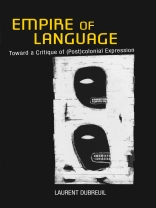The relationship between power and language has been a central theme in critical theory for decades now, yet there is still much to be learned about the sheer force of language in the world in which we live. In Empire of Language, Laurent Dubreuil explores the power-language phenomenon in the context of European and, particularly, French colonialism and its aftermath. Through readings of the colonial experience, he isolates a phraseology based on possession, in terms of both appropriation and haunting, that has persisted throughout the centuries. Not only is this phraseology a legacy of the past, it is still active today, especially in literary renderings of the colonial experience—but also, and more paradoxically, in anticolonial discourse. This phrase shaped the teaching of European languages in the (former) empires, and it tried to configure the usage of those idioms by the ‘Indigenes.’ Then, scholarly disciplines have to completely reconsider their discursive strategies about the colonial, if, at least, they attempt to speak up.Dubreuil ranges widely in terms of time and space, from the ancien régime through the twentieth century, from Paris to Haiti to Quebec, from the Renaissance to the riots in the banlieues. He examines diverse texts, from political speeches, legal documents, and colonial treatises to anthropological essays, poems of the Négritude, and contemporary rap, ever attuned to the linguistic strategies that undergird colonial power. Equally conversant in both postcolonial criticism and poststructuralist scholarship on language, but also deeply grounded in the sociohistorical context of the colonies, Dubreuil sets forth the conditions for an authentically postcolonial scholarship, one that acknowledges the difficulty of getting beyond a colonialism—and still maintains the need for an afterward.
表中的内容
Prologue Part I. Phraseologies
Chapter 1: (Post)colonial Possessions
Chapter 2: Haunting and Imperial Doctrine
Chapter 3: The Revenant Phrase Part II. Giving Languages, Taking Speech
Chapter 4: The Languages of Empire
Chapter 5: Interdiction within Diction
Chapter 6: Today: Stigmata and Veils
Chapter 7: Reinventing Francophonie Part III. Disciplining Knowledge
Chapter 8: Formations and Reformations of Anthropology
Chapter 9: The Impossible Colonial Science
Chapter 10: Who Will Become a Theoretician?After the AfterwardsNotes
Bibliography
Index
关于作者
Laurent Dubreuil is Professor of Romance Studies and Comparative Literature, Director of the French Studies Program, and member of the cognitive science program and graduate field at Cornell University. He is the editor of diacritics. He is the author of several books in French, including, most recently, Le Refus de la politique.












